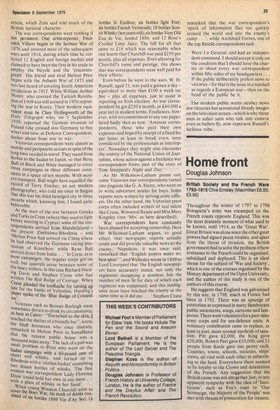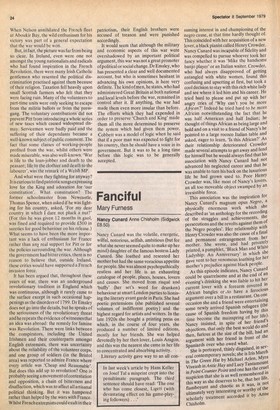Home front
Douglas Johnson
British Society and the French Wars 1793-1815 Clive Emsley (Macmillan £8.95; 0.95) Throughout the winter of 1797 to 1798 Bonaparte's army was encamped on the French coasts opposite England. This was the most dramatic moment of what used to be known, until 1914, as the 'Great War'. Great Britain was alone since the other great powers had signed peace treaties, and apart from the threat of invasion, the British government had to solve the problem of how resistance to the French could be organised, subsidised and deployed. This is an ideal theme for the subject of 'War and Society', which is one of the courses organised by the History department of the Open University, and the author of this study is one of the authors of this course.
He suggests that England was galvanised by this war, in 1798, much as France had been in 1792. There was an upsurge of patriotism as expressed in many flamboyant public statements, songs, cartoons and lampoons. There were volunteersfora part-time army corps and for sea-defence units. A voluntary contribution came to replace, at least in part, more normal methods of taxation. Pitt gave 12,000, the King gave £20,000, Robert Peel gave £10,000, and 21 people from Keele gave one penny each. Counties, towns, schools, societies, ships' crews, all vied with each other in subscribing to the fund. Everywhere there seemed to be loyalty to the Crown and detestation of the French. Any suggestion that the British cause was not altogether just, or any apparent sympathy with the idea of lacobinism', such as Fox's toast to 'Our Sovereign, the Majesty of the People' was met with threats of prosecution for treason. When Nelson annihilated the French fleet at Aboukir Bay, the wild enthusiasm for his victory was part of a general expectation that the war would be won.
But, in fact, the picture was far from being so clear. In Ireland, even were one not amongst the young nationalists and radicals who had found inspiration in the French Revolution, there were many Irish Catholic gentlemen who resented the political discrimination practised against them because of their religion. Taxation fell heavily upon small Scottish farmers who felt that they were facing ruin. Many of the volunteers to part-time units were only seeking to escape from the militia ballots or from the pressgang. The voluntary contributions did not prevent Pitt from introducing a whole series of new taxes which caused widespread dismay. Servicemen were badly paid and the suffering of their dependants became a well-known subject of public comment. The fact that some classes of working-people profited from the war, whilst others were made miserable, was also well-known. War is life to the loan-jobber and death to the peasant; life to the clothier and death to the labourer', was the remark of a Welsh MP.
And what were they fighting for anyway? It is curious to find patriotic songs expressing love for the King and adoration for 'our constitution'. What constitution? The former schoolmaster from Newcastle, Thomas Spence, when asked if he was fighting for his country, asked, 'For my dear country in which I dare not pluck a nut?' (For this he was given 12 months in gaol, was fined and required to provide £500 in sureties for good behaviour on his release.) What seems to have been the more important was a lack of enthusiasm for France rather than an real support for Pitt or for the policies surrounding the war. Although the government had bitter critics, there is no reason to believe that, outside Ireland, these critics would have supported a French invasion force.
It has been argued that, throughout these years of war, there was an underground revolutionary tradition in England which was continuous, although it rarely came to the surface except in such occasional happenings as the disorders of 1799. Dr Emsley does not go into the details, but he speaks of the seriousness of the revolutionary threat and he repeats the evidence of witnesses that an idea was abroad: the remedy for famine was Revolution. There were links between the conspirators, including the United Irishmen and their counterparts amongst English extremists, there was uncertainty about the reliability of the volunteer corps, and one group of soldiers (in the Bristol area) was reported to admire France where every article was 'Cheap and Reasonable'. But does this add up to revolution? One is probably seeing a movement of contestation and opposition, a chain of bitterness and disaffection, which was to affect all artisanal political thinking. But it was hampered rather than helped by the wars with France. Whilst French extremists could exult in their patriotism, their English brothers were accused of treason and were punished accordingly.
It would seem that although the military and economic aspects of this war were overshadowed by an important political argument, this war was not a great promoter of political or social change. Dr Emsley, who has presented a clear and well documented account, but who is sometimes hesitant in advancing his own opinions, is here very definite. The kind of men, he states, who had administered Great Britain at both national and local levels before the war, remained in control after it. If anything, the war had made them even more insular than before. The efforts which they had expended in order to preserve 'Church and King' made • them all the more determined to preserve the system which had given them power, Cobbett was a model of logic when he said that if a poor man was expected to fight for his country, then he should have a voice in its government. But it was to be a long time before this logic was to be generally accepted.



































 Previous page
Previous page